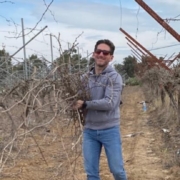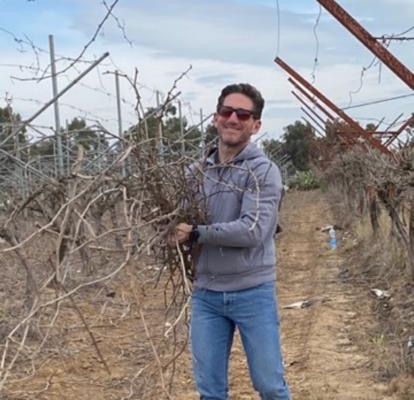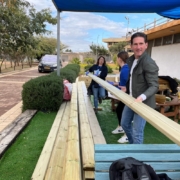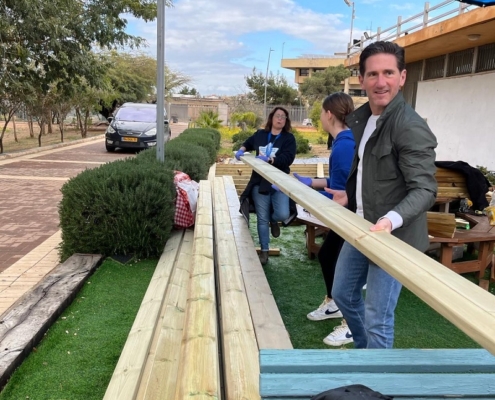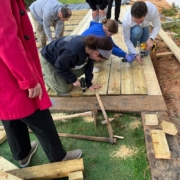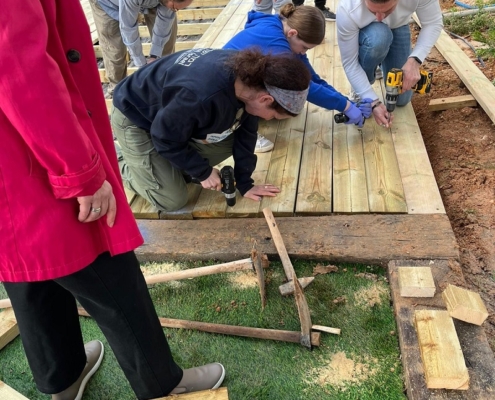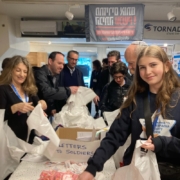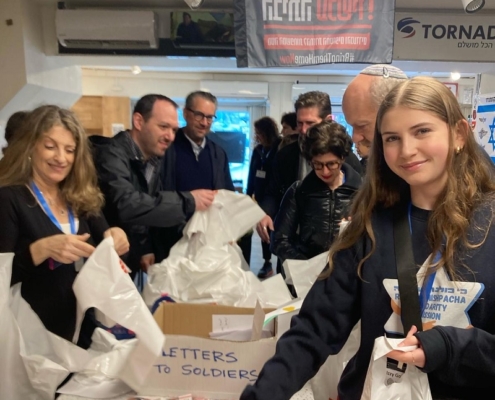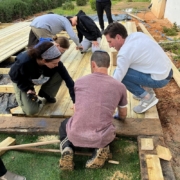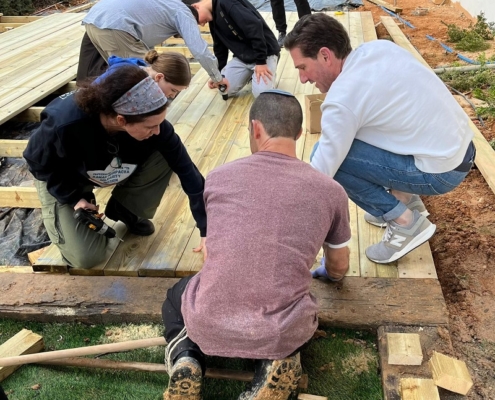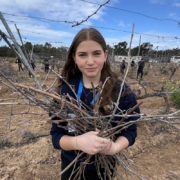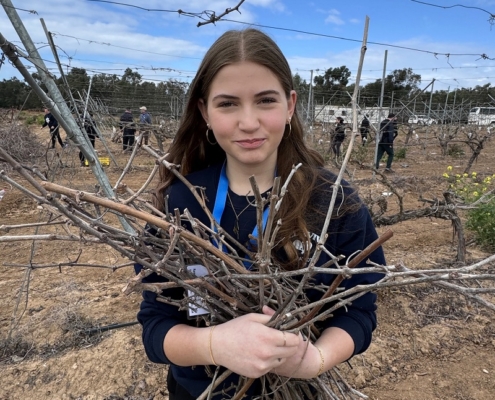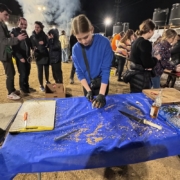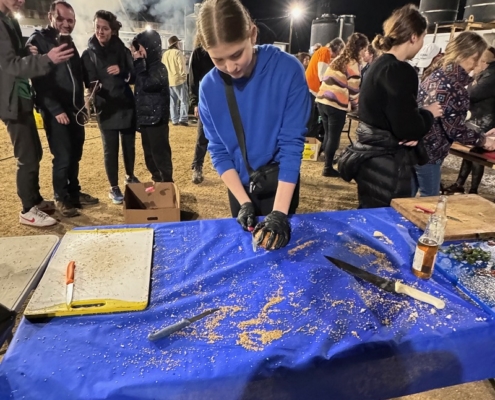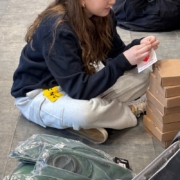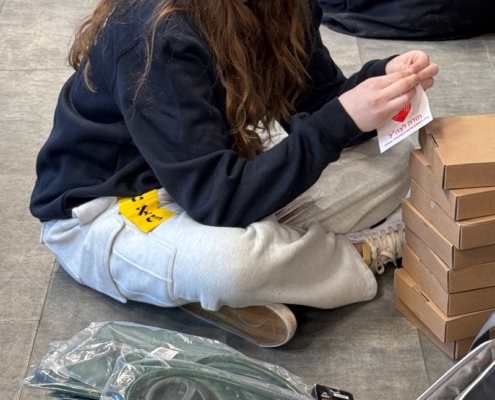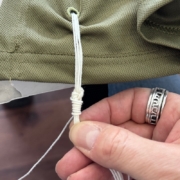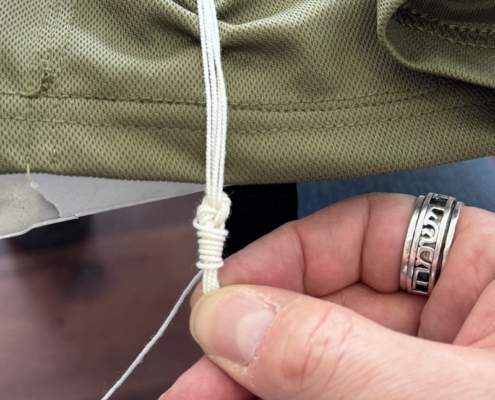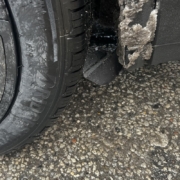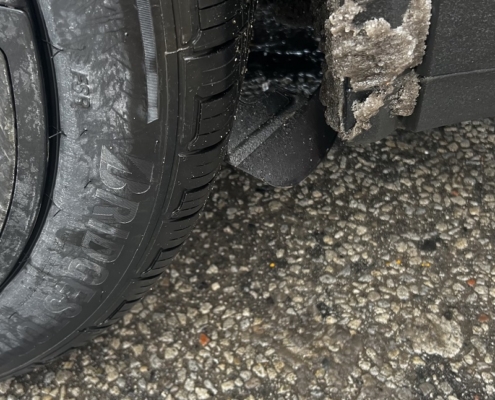Israel Strong
On October 7, as the realisation of what had occurred in Israel slowly came into focus, I, like many other Jews around the world, felt something deeper than shock, horror, pain, and empathy: I felt a need to be “there” – to be in my homeland, to stand alongside my people in the place that, as crazy as it sounds to many in the modern era, will always be my last stop.
That is because, beyond the inhumane horror and trauma of what had unfolded, like so many other Jews living in Canada and the U.S., my family tree bears the scars of numerous broken branches, much of them ripped off and burned during the Holocaust, when my grandparents’ respective families were forced to flee what is current-day Ukraine and Lithuania, and many more branches broken even before then during the numerous pogroms that targeted Jews.
Indeed, as the proverbial October 7 bomb was still ringing in my ears, my instinct was to go and help defend the one place that I know, as a Jew in the 21st century, that my family and I cannot be singled out, persecuted, or denied the right to exist and to be because we are Jewish.
Four months and four days later, I found myself crammed into the back of an El Al flight en route to Ben Gurion airport with my 14-year-old daughter Izzy beside me – hurtling across the Atlantic and Europe into a war zone with little more than the rest of us: second- and third-hand context and perspective of what had happened, what was happening, and what might come next.
Our first few days on the ground weren’t much different than previous visits: we traversed Jaffa and Tel Aviv, and then parts of Jerusalem, reminiscing at places we had seen before and marvelling at the rapid and impressive changes that had occurred since. The streets – and the mood – were quieter, though the rain and time of year seemed to partially explain that away.
Yet there was something tangibly different: an odd combination of business-as-usual combined with a sense of sadness and resolve, augmented by the many, many posters and billboards of the missing hostages and calls to bring them home, by the many, many yellow ribbons tied on car-door handles, and the many, many posters and billboards that, translated into English say “Together We Will Win,” but to me loosely convey a phrase those in North America well know:
“Israel Strong.”
My connection to Israel has long been, for lack of a better way of putting it, a place I have felt I belonged – and had no need or reason to justify or explain my history, culture, or being, and where I felt surrounded by a populace that felt exactly the same way.
Being on a volunteer solidarity mission amplified that, and then some: our group of 25 mostly American teens and adults, led by the incredible Rabbi “Ed” Snitkoff, reinforced my own sense of belonging, and of my own religious and cultural roots.
It also, in an odd way, reinforced my sense of resolve – as one of hundreds of thousands of Jews in Toronto and other parts of the world drinking in fire hoses of rhetoric that, beyond blanketed or blatant antisemitism and vitriol had made me second-guess my own thinking and reasoning behind why Oct. 7 even occurred in the first place, as well as what it means to be a “Zionist.”
Bearing witness to the planned, sadistic pogroms that stretched out far beyond the fences of Gaza and well into the heartland of Israel and its people recalibrated my internal moral compass. Hearing and feeling the wheels of our bus vibrate over tank tracks imprinted in the road, witnessing – literally – an act of terrorism unfold in front of us and being forced to duck and cover as it was happening, and feeling just how pervasive and widespread the events of October 7 were and still are and how they have affected so many across the country allowed me – and others – to experience the loss, grief, and fortitude of what it means to be Jewish and Israeli, and under attack.
We have all seen the images of a destroyed Gaza, and the human suffering Israel’s response has unleashed on its population. What we have not all seen, and what my daughter and I experienced, was the sheer magnitude and intent of what the ‘Black Sabbath’ unleashed on Israel: farms and vineyards destroyed by fire; bomb shelters blown out by grenades and riddled with bullets; blackened spots on roads where cars were shot up and burned; the site of a music festival now a field of makeshift pictures and memorials of beautiful faces and souls that now resembles a feld.
What we also have not all seen or experienced is the resolve of Israelis – of Jews – to protect and defend our homeland: the young women and men literally on the front lines; the millions behind the scenes mobilising and volunteering to support the country in ways that in any other place in the world would simply be labelled patriotism.
What we further haven’t seen or experienced – and which my daughter and I as well as our small group of roving outsiders were able to absorb at least partially – is the tectonic shift in Israel’s fiber: from a diverse, multicultural, varied, opinionated, gruff, and gritty society, to a diverse, multicultural, varied, opinionated, gruff, and gritty society that is now silently unified – left, right, religious, secular, traditional, modern, Ashkenazic, Sephardic – in its resolve to persevere as a state and as a people.
For me, and for others, that tectonic shift manifested itself everywhere: in the crowded restaurants we ate at, in the packed stores we shopped at, in the makeshift volunteer kitchen where we helped prepare shabbat meals for IDF soldiers, in the former electronics store in Jerusalem that has been converted into a donation centre for extra supplies and treats for front-line soldiers, in the quiet third-floor room in Jerusalem where we looped and knotted tzitzit – fringes typically worn by religious Jews but currently being donned by virtually every man and woman in the IDF, an additional “shield of armour,” as our security guard Naor, who had spent three months in Gaza put it.
Missing in all of it – including the first-hand stories we heard from those who directly lost loved ones on October 7 or are still waiting for their return from captivity: Anger, wrath, revenge.
For Israel, it is still October 7, and it will not be October 8 for a while. The country and people are sitting shiva, doing what we all do as Jews during a time of mourning. At the same time, and as is inscribed in Judaism, life trumps death. Holidays and celebrations trump grief and mourning.
While my fear of my family and I being singled out and denied our rights and freedoms or worse, our existence, for being Jewish, remains, my fear of having a homeland to go to – a place to be a Jew – does not. My takeaway from my very small part of doing our part, is that October 8 will eventually come, and life will go on – as will Israel.
Why
By Corey Goldman
Why are you right, and I am wrong?
Why does he hate us, and want us dead?
Why does she hate them so much that she does not want them to exist?
Why do they chant from the River to the Sea?
Why are they so convinced that it must be one way or the other?
Why are we so convinced of the same?
Why are my beliefs better or more righteous than yours?
Why is her history more relevant or correct than his?
Why does that enrage me?
Why does that enrage you?
What do they want?
Why are my morals and values not everyone else’s?
Why is my reality and interpretation not everyone else’s?
Why is it that they harm others to be heard?
Why is it that we harm them to be validated?
What do we want?

